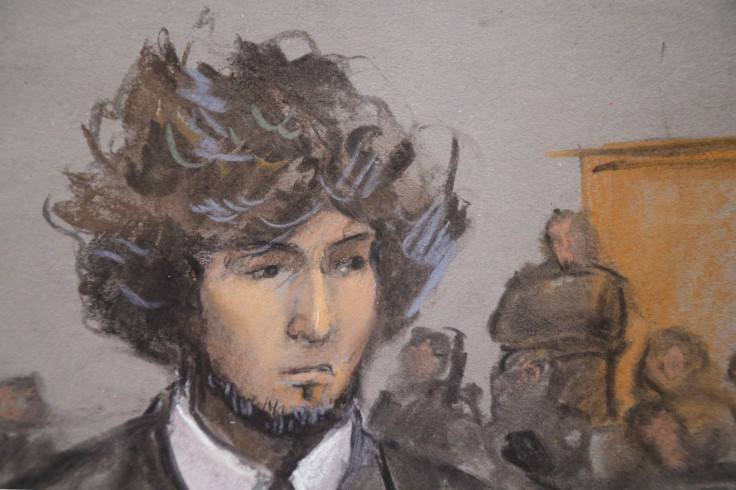Boston Marathon Bombing Suspect Dzhokhar Tsarnaev: 7 Basic Things To Know About The Trial

Jury selection began Monday for the trial of Dzhokhar Tsarnaev, the 21-year-old Chechen-American accused of building and planting bombs at the 2013 Boston Marathon. The almost 2-year-old case is sure to draw much attention over the next few months as more details about the college student's past, religion and criminal activity are hashed out by prosecutors seeking the death penalty. Here are seven basic things to know about the trial:
1. The defendant: At the time of the April 15, 2013, Boston Marathon bombing, Tsarnaev was a 19-year-old marine biology student at the University of Massachusetts - Dartmouth. Friends described him to reporters as a laid-back guy who grew up in Cambridge, smoked a lot of marijuana and spoke English well.
2. The incidents: He and his brother, 26-year-old Tamerlan Tsarnaev, allegedly created pressure-cooker bombs they detonated at the marathon's finish line. The explosions wounded 264 people and killed three. The brothers escaped -- Dzhokhar Tsarnaev even partied afterward -- but quickly were identified as suspects. They were allegedly Islamic extremists.
On the night of April 18, officials say, they killed a Massachusetts Institute of Technology police officer and initiated two carjackings. Early the next morning, the brothers had a shootout with police. Dzhokhar Tsarnaev drove over his brother, ditched the car and ran away to hide underneath a resident's boat in Watertown. There, a severely injured Tsarnaev wrote messages like "We Muslims are one body you hurt one you hurt us all" and "The U.S. Government is killing our innocent civilians." He was arrested and eventually taken to the Federal Medical Center Devens in Ayer, Massachusetts. He is isolated from other prisoners, USA Today reported.
3. The charges: Tsarnaev is facing 30 federal counts to which he's plead not guilty, including:
conspiracy to use a weapon of mass destruction resulting in death
use of a weapon of mass destruction resulting in death; aiding and abetting
bombing a public place resulting in death; aiding and abetting
possession and use of a firearm during and in relation to a crime of violence resulting in death; aiding and abetting
carjacking resulting in serious bodily injury; aiding and abetting
use of a weapon of mass destruction; aiding and abetting
The state has also indicted Tsarnaev for the murder of the MIT officer. See the full list of federal charges here.
4. The trial: It's being held in Boston at the U.S. Court of Appeals for the First Circuit. The defense wanted the trial moved out of the area due to media coverage and potential juror bias, but was shot down. More than 1,000 people have been summoned, and the witness list includes more than 700 people.
5. The key players: Prosecuting Tsarnaev is U.S. Attorney Carmen Ortiz, helped by a team of assistant U.S. attorneys, including William Weinreb, Aloke Chakravarty and Nadine Pellegrini. They all have experience dealing with terrorism cases, Time magazine reports. On the defense are Judy Clarke, who represented the Unabomber, Ted Kaczynski; public defender Miriam Conrad; and death penalty defense professor David Bruck.
6. The timeline: U.S. District Judge George O'Toole Jr. told prospective jurors Monday that the trial itself would probably start Jan. 26. He said he expects it to last three or four months.
7. The death penalty: Massachusetts abolished the death penalty in 1984, but because federal prosecutors are involved, they can seek it, CNN reported. U.S. Attorney General Eric Holder announced last January he would push for the death penalty. "It is crucial that the United States send a message across the world that terrorists who seek to attack our homeland and bring harm to our citizens will be brought to justice and receive the severest punishment under our laws," he said in a statement.
© Copyright IBTimes 2024. All rights reserved.






















